Dental Implants Arlington Heights
Replace Any Number of Missing Teeth

In the not-so-distant past, patients struggled with limited options for replacing missing teeth, experiencing oral discomfort, jawbone deterioration, and a diminished quality of life. Today, Dr. Ernie Costello and Dr. Jay DeHart are happy to offer a superior, seamlessly lifelike alternative – dental implants. By replicating the entire structure of your natural tooth and integrating it with the natural tissues, an implant dentist can offer patients the sturdiness and long-lasting quality they need for a better, brighter smile with dental implants in Arlington Heights, IL. Are you a candidate for this reconstructive procedure? Find out by contacting Costello & DeHart Dental Excellence today and schedule a complimentary consultation with our team.
Why Choose Costello & DeHart Dental Excellence for Dental Implants?
- Entire Dental Implant Procedure Completed Under One Roof
- Potentially Replace Any Number of Missing Teeth for Life
- State-of-the-Art Equipment for Precise, Reliable Results
What Are Dental Implants?

Other tooth replacement options like dental bridges and dentures only replace the visible portion of missing teeth, which leaves a lot left to be desired when it comes to comfort and functionality. On the other hand, dental implants replace teeth both above and below the gumline. A small titanium dental implant post inserted directly into the jawbone acts as the root of the missing tooth. This provides lifelike strength and stability for the final restoration it supports, whether that’s a crown, bridge, or denture. The result of rebuilding missing teeth from the roots up like this is a smile that looks, feels, and functions just like natural. That’s why dental implants are widely considered to be the gold standard of tooth replacement by both dentists and patients alike!
The 4-Step Dental Implant Process

Having dental implants successfully placed and restored is a considerable process, requiring multiple appointments and a time commitment. Although it may seem like an overwhelming commitment of time and money on your part, you will be pleased with the results, ultimately viewing your investment to be well worth it. Naturally, each patient’s experience will vary simply because every case is different. For example, someone who needs a bone graft or periodontal treatment can expect to undergo a longer implant process than another individual who does not require preliminary treatments.
To better understand how dental implants work in Arlington Heights, review the following steps, and feel free to contact us with any additional questions or concerns:
Initial Dental Implant Consultation

First, our team will need to determine whether or not you’re the right candidate for the procedure. This will require that you schedule an initial consultation with our implant dentist in Arlington Heights. While most patients can enjoy implants, generally good oral health and an adequate amount of jawbone density are the highest indicators of success. To determine if these are present, Dr. Costello and Dr. DeHart will use state-of-the-art dental technology to view your jaw, teeth, nerves, gums, and complete facial structure.
If these conditions aren’t met, additional procedures might be required before we can begin with your implant placement procedure. These can include bone grafting, sinus lifts, periodontal treatment, or even tooth extraction.
Dental Implant Surgery

Implants are designed to replace the “roots” of your natural teeth that exist underneath the gumline; that means that we’ll need to surgically insert them into the jawbone. Your implant dentist in Arlington Heights will make one more incision in your gums after administering local anesthesia to numb the areas receiving the implants. After securing them into place and angling them for maximum support, we will close the gum tissue and send you home to recover.
The best part about undergoing dental implant placement with Costello & DeHart Dental Excellence is that you never have to seek a referral. The entire process is completed in-house, making for a more enjoyable and comfortable experience!
Dental Implant Osseointegration/Abutment

After this procedure, you will undergo a period of healing – during this time, your new implant(s) will form a strong bond with your natural tissue, creating a lasting foundation for replacement teeth. This process is known as osseointegration, and it must be a success to prevent future implant failure. It is necessary that you follow the instructions provided to you by our team, as this will ensure you heal promptly and successfully.
Once you have fully healed from your implant surgery, our team will install a metal abutment, which is a connector appliance that is used to bring together your custom restoration and dental implant when placed.
Delivery of Dental Implant Restorations

Finally, you’ll return to our dental office so that our doctors can design and place a custom restoration on top of the dental implants in Arlington Heights, completing the process. All-ceramic dental crowns are used to restore individual teeth, while an implant bridge or implant denture prosthetic can cover a more extensive area in a cost-effective fashion. With proper care and maintenance, dental implants can easily last 30 years, 40 years, or for the rest of the patient’s life!
Benefits of Dental Implants

When it comes to replacing missing teeth, dental implants are the most reliable option. They go a step further than traditional treatments by also recreating the tooth roots that are normally hidden beneath the gums. As a result, there are countless benefits of dental implants in Arlington Heights compared to dentures and dental bridges. Read on to learn how dental implants can dramatically improve your smile and overall quality of life!
Day-to-Day Benefits

Dental implants are so comfortable and feel so natural that eventually, you may forget you even have them! They don’t rely on your healthy teeth or your gums for support. Instead, the titanium posts fuse to your jawbone, providing a stable foundation for the dental crown, bridge, or denture that is placed on top. Unlike with traditional dentures, you’ll never need to worry about any slipping or irritation. In fact, you’ll regain almost all of your natural biting force. You should have no trouble eating all of your favorite foods again.
Additionally, your replacement teeth are made of all-ceramic material due to its ability to closely mimic tooth enamel. They are carefully crafted to match the color, size, and shape of your natural teeth. You can chew, speak, and smile confidently knowing your new teeth look flawless. No one will be able to tell which of your teeth are “real” and which are implants!
Health Benefits

When you lose a tooth, your jawbone will slowly deteriorate because it isn’t being stimulated by the root. This increases your risk of several oral health concerns because your remaining teeth won’t have the support they need to stay in place.
As the only tooth loss solution that replaces both the root and the crown of the tooth, dental implants in Arlington Heights keep your jawbone strong. Because of this, they lower your risk of cavities, gum disease, and additional tooth loss. They also prevent your remaining teeth from drifting out of position. In addition, a strong jawbone will support your facial tissues to help prevent wrinkles and sagging skin – you’ll maintain a youthful glow for years to come!
Long-Term Benefits

Dental implants are by far the most reliable method of replacing lost teeth. They have a success rate of more than 95 percent. Plus, they’re incredibly easy to maintain – all you have to do is brush and floss them like real teeth and visit your implant dentist in Arlington Heights regularly.
Because dental implants can potentially last for a lifetime with the right care, they are the most cost-effective solution. Although they cost more initially than bridges and dentures, you should never need to worry about having them replaced down the road. Not to mention, they also improve your oral health to reduce your long-term dental care expenses. Overall, they’re an investment in your smile that is worth making!
Who Dental Implants Can Help

No matter how many teeth you’re missing, dental implants can help. In fact, most patients suffering from tooth loss are a great candidate for this life-changing treatment! We’ll closely inspect your teeth, gums, jaw, and medical history to make sure dental implants are a good choice for you. Then, we’ll work with you to determine how many dental implants you need as well as what kind of restoration you can expect to receive based on the extent of your tooth loss.
Missing 1 Tooth
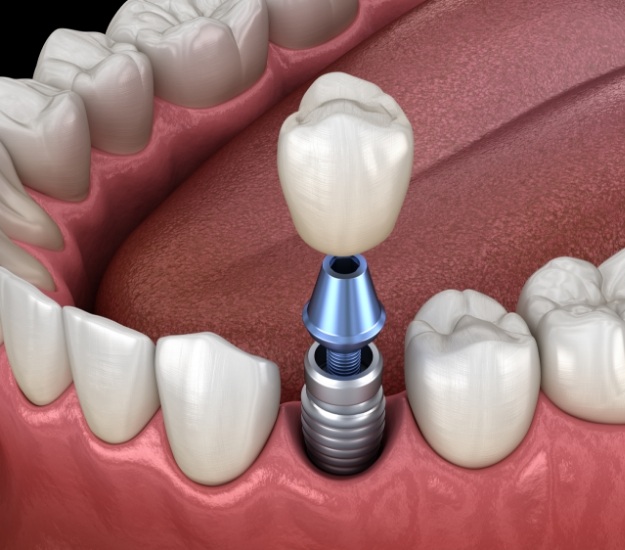
Replacing a single missing tooth doesn’t require a traditional dental bridge. Instead, we can use one titanium implant post and place it within the jawbone. Once a metal abutment is attached, we can secure a customized dental crown on top for a flawless and fully functional smile.
Missing Several Teeth
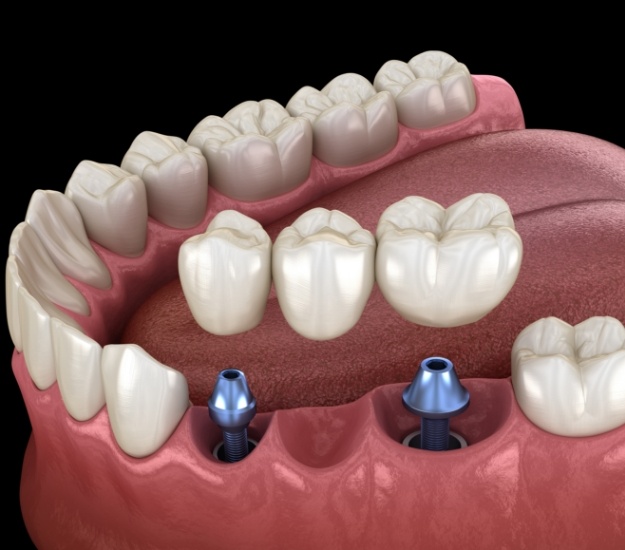
If you’ve lost 1 or more teeth in a row, you can give your bridge the support of dental implants. Instead of relying on your teeth for support, 1-2 dental implants secure the bridge to your jawbone, providing a close replica of your natural teeth. You’ll preserve your remaining teeth because they are unchanged. Not to mention, they’ll have the support they need to stay in place using a permanent solution to treat your tooth loss.
Missing All Teeth
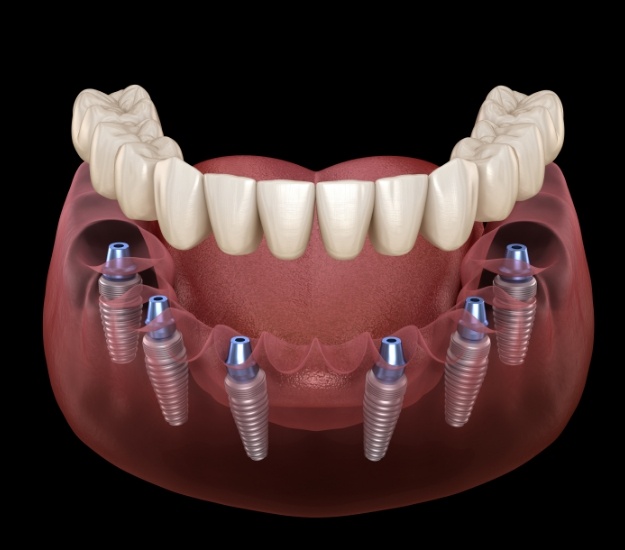
Are you missing an entire arch or all of your teeth? Gaps in your mouth can make it difficult to complete daily tasks like eating and speaking, impacting your overall quality of life. That’s why our team of professionals at Costello & DeHart Dental Excellence offers the latest tooth replacement solution, implant dentures. We restore the entire structure of your missing teeth so that they feel, look, and function nearly identically to your natural teeth. To learn if you’re a good candidate for the procedure, be sure to schedule a consultation today!
Learn More About Implant Dentures
Fast Implant Dentures
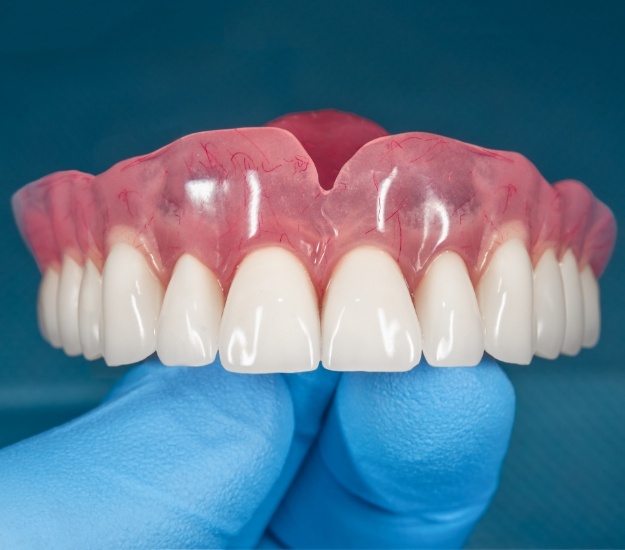
If you’ve been dealing with missing teeth or wearing full dentures for quite some time, then you may not have enough jawbone density to support a traditional implant denture. Instead, you may be a good candidate for All-On-4 dental implants. For this method, a full denture can be anchored into place with just four dental implants strategically placed into the strongest parts of the jawbone. During your consultation, we’ll review all your options for restoring your complete smile and help you choose the one that’s right for you.
Learn More About All-On-4 Dental Implants
Understanding the Cost of Dental Implants

If you’re considering dental implants, you’re probably wondering about the cost of your treatment. Thankfully, we’ve included some useful information about the process as well as some factors that can contribute to the cost. Plus, you can learn why dental implants are always worth investing in. Keep reading to learn more about the potential cost of your treatment as well as some important answers about insurance coverage.
Types of Dental Implants
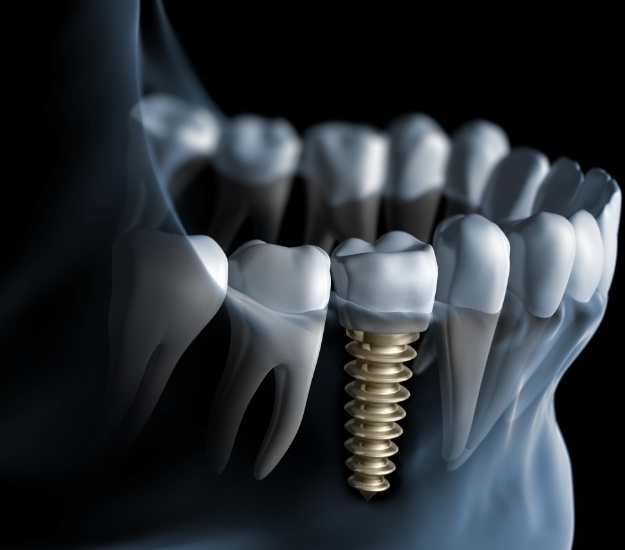
Every dental implant case is different, and one of the main factors that affect cost is the number of teeth that you’re missing. For a single missing tooth, we will recommend a single-tooth implant to complete your smile. If you’re missing multiple teeth consecutively, we can offer you an implant-supported bridge. And, for those missing all or most of their teeth, an implant denture is the best option. Each of these types of implants will have different price tags, which is why an initial consultation where a treatment plan is developed is integral.
The Stages of Dental Implant Treatment
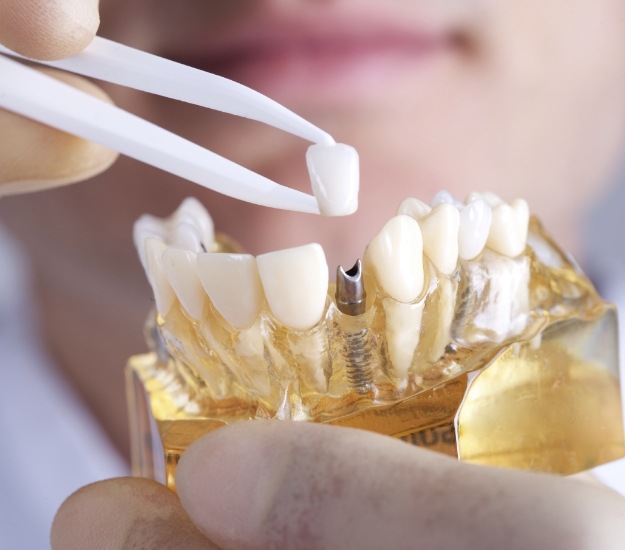
There are multiple stages of the implant process, and each one will incur a unique cost. First, your dental implants are surgically placed. Then, you’ll wait 3 to 4 months for your implants to fuse to your jawbone. Next, you’ll come back into our dental office where we will place your restorations for a strong and beautiful smile. Some patients may need additional treatments like periodontal treatment or bone grafting. These procedures must be completed before you receive dental implants to set your surgery up for success.
How Dental Implants Can Save You Money

Because dental implants tend to have a higher price tag than other replacements, you may be wondering whether they are worth the investment. The answer is yes—dental implants bring our patients a variety of health, beauty, and functional benefits. Many patients are willing to spend a little more if it means they can eat all of their favorite foods and speak with confidence. Plus, when maintained properly, this solution can last for a lifetime. This means that dental implants may actually be the more cost-effective option in the long term because you’ll be avoiding spending more time and money on additional replacements.
Does My Dental Insurance Cover Dental Implants?

Typically, dental insurance will not cover your dental implant treatment because it is seen as an elective procedure. However, our friendly front desk team is experienced in maximizing your benefits while minimizing your out-of-pocket spending. Some aspects of the process may be covered such as your initial consultation or possible periodontal treatment. Of course, this will all depend on your specific case. We will work closely with your insurance company to ensure that you’re taking full advantage of your coverage.
Dental Implant FAQs
I Smoke. Can I Still Get Dental Implants?
Yes, but your Arlington Heights implant dentist recommends that you quit before the dental implant process begins. Smoking or chewing tobacco hinders your body’s healing process, which is critical to getting dental implants. A huge part of the process involves your jawbone healing and integrating with the implant post, and if your healing ability is compromised, your body could end up rejecting the implant. To make sure the process goes smoothly, we suggest using this as an excuse to quit tobacco.
I Have Diabetes. Can I Still Get Dental Implants?
Yes, but, like with smoking, it comes with a higher risk of implant failure, especially if your diabetes isn’t well-managed. Poorly controlled diabetes lowers your body’s ability to fight infection and slows down your healing processes, both of which can increase the risk of your body rejecting dental implants in Arlington Heights. If you’re diabetic and considering getting implants, talk to your endocrinologist or primary care physician about how to manage your condition before starting the implant process.
Will it hurt to receive dental implants?
When preparing for your oral surgery, you can expect that our dentists will administer local anesthesia so that you do not feel anything during your procedure. Once everything is complete, it will take time for the anesthesia to wear off; however, when it does, you can expect to feel some soreness and minor discomfort. Fortunately, this is short-lived, and over-the-counter pain medication can help to relieve some of the aching you might feel in the days after your procedure.
Do dental implants require specialized cleaning tools?
No, one of the unique benefits of dental implants is how easy they are to keep clean. Instead of purchasing many different tools and products designed specifically for your new artificial teeth, you can rely on a soft-bristled toothbrush and non-abrasive toothpaste to give your teeth the thorough cleaning they need. Traditional dental floss is also fine to use, but if you struggle to get in between teeth, you can opt for a water irrigator or floss threader to make this part of your oral hygiene routine easier.
Dental Implants Post-Op Instructions

It’s understandable to feel nervous about dental implant surgery and what comes afterward. After all, getting titanium posts inserted into your jawbone is a fairly invasive procedure. However, as long as you follow our dental implant post-op instructions in Arlington Heights, your recovery process should go smoothly. Below are some basic guidelines on what you can expect during the few days following dental implant placement.
What to Do Directly After Dental Implant Surgery

Once the surgery is complete, a blood clot will begin forming around the site. The blood clot must remain undisturbed; otherwise, the healing process may take longer. For the first 24 to 48 hours, you should avoid activities that could dislodge the blood clot, such as:
- Spitting (swallow your saliva instead)
- Blowing your nose (dab at your nose with a tissue instead)
- Drinking through a straw
- Smoking
- Touching the surgical site with your tongue or finger
Common Side Effects

After getting dental implants in Arlington Heights, you’ll notice a few common side effects. Don’t worry, though; in most cases, all of the following symptoms should gradually subside after a few days:
- Bleeding – The surgical site may bleed on and off for a day or two, but applying light pressure with a gauze pad should reduce or stop it.
- Swelling – Most patients experience swelling around the site for three to seven days after the surgery. Holding a cold compress to your cheek can help but be sure to only do so for ten minutes at a time.
- Pain – Taking prescribed or over-the-counter pain relievers as directed can reduce your post-op discomfort.
If any of these symptoms begin to intensify rather than fade away, please give our office a call.
Diet

In terms of which foods to eat after dental implant surgery, try to stick to soft foods that require very little effort to chew. Every patient’s recovery rate is different, so you can gradually incorporate heartier foods into your diet once you feel comfortable. However, be wary of particularly crunchy foods and avoid chewing too close to the implant site.
Some examples of soft foods to eat during this period are yogurt, mashed potatoes, pasta, scrambled eggs, pudding, ice cream, and soup (as long as it’s not too hot).
Health & Oral Hygiene

As long as you’re careful around the implant site, you can brush and floss the rest of your teeth as you normally would. To minimize bacteria in your mouth, rinse with salt water two or three times a day (but don’t spit too forcefully). You could also use a prescription mouth rinse but stay away from anything alcohol based.
What to Do After Your New Teeth Are Attached
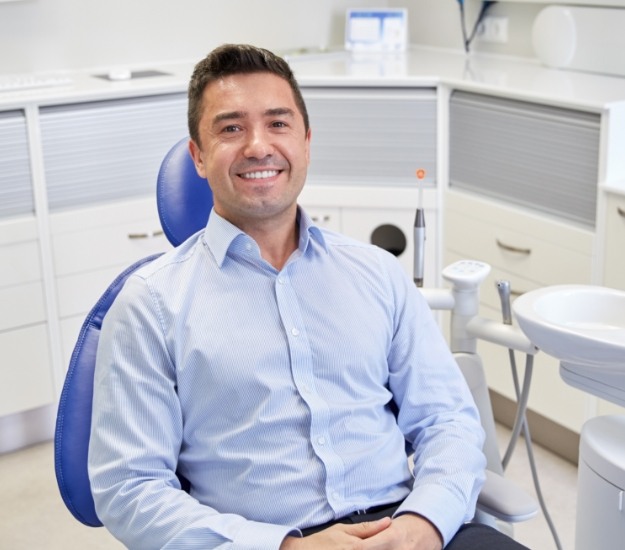
After your implant dentist in Arlington Heights places your crown, bridge, or denture, you can expect a much smoother recovery compared to right after the surgery. You probably won’t experience bleeding or swelling, and you should be ready to eat with your new teeth right away. While you may feel some mild sensitivity, this should be temporary and easily managed.
I Need a Checkup & Cleaning I Need a Dentist for My Child I Need a Dentist for My Entire Family I'm Worried About Gum Disease I Have a Cavity or Broken Tooth I am Missing One or More Teeth I Want to Enhance My Smile I Want to Straighten My Teeth I Have a Dental Emergency I Have Jaw Pain/Headaches View Our Services
